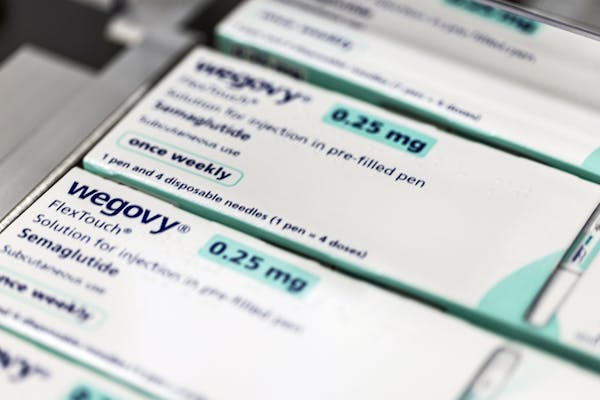One of the world's largest drug manufacturers is suing a small east metro wellness center over the way it marketed and sold a compounded, off-brand version of its blockbuster weight-loss medications.
Novo Nordisk filed its lawsuit this month in U.S. District Court, accusing the Minnesota Vitality and Anti-Aging Center of false advertising and trade infringement. The boutique clinic provides cosmetic and functional medicine services in Forest Lake and Shoreview.
The lawsuit is Novo's first in Minnesota, but part of a larger strategy to protect profits from its patented GLP-1 medications, Ozempic and Wegovy, against sales of knockoff versions.
The Denmark manufacturer has sued 40 U.S. clinics, spas and weight-loss centers so far over their marketing and sales of compounded medications containing semaglutide, which aren't subject to the same federal regulatory requirements as the brand name versions that are approved by the U.S. Food and Drug Administration.
"Unapproved compounded 'semaglutide' drugs do not have the same safety, quality and effectiveness assurances as Novo Nordisk's FDA-approved semaglutide medicines, and patients should not use a compounded drug if an approved drug is available," the drugmaker said in a written statement.
Minnesota Vitality is hardly alone in selling off-brand GLP-1 medications. Chanhassen-based Life Time has partnered with a compounding pharmacy to offer a GLP-1 option to members in its Miora weight-loss program. (A spokesman for the publicly traded company said that Life Time has not been sued or received any warning letters over this practice.)
But Minnesota Vitality crossed a line with Novo, according to the lawsuit, when it specifically mentioned semaglutide and Ozempic on its website and social media postings. Semaglutide is the active ingredient in Novo's medications that mimics the GLP-1 hormone in the stomach that regulates hunger and fullness.
Minnesota Vitality co-founder Heather Manship did not reply to calls or emails this week regarding the lawsuit against her center, which has been in operation since 2021. But its website appears to have been edited to eliminate the words that triggered the dispute. A Novo spokesman declined to comment on whether the changes would be enough to resolve the lawsuit, which also demands that Minnesota Vitality surrender profits from its "unfair competition."
U.S. patent law gives manufacturers exclusive periods in which to produce and sell their medications, allowing them to recoup the substantial costs of drug research and development. However, compounding pharmacies are allowed in certain circumstances to produce comparable versions when the brand name drugs are in short supply.
The FDA has placed both Novo's Ozempic and Wegovy on its federal shortage list, though at the moment only one dosage of the injectable medication is limited. Rival weight-loss drugs Mounjaro and Zepbound, made by Eli Lilly, also are on the shortage list, due in large part to the overwhelming demand.
The latest lawsuit is similar to one settled in July by Renew MedSpa, an Eagan clinic that had compared its compounded weight-loss options to Lilly's brand name medications. MedSpa agreed for one year to specify on its website that its options are neither FDA-approved nor related to Lilly's drugs.
Obesity has been a runaway chronic health problem over the past half-century in the U.S., where sedentary lifestyles and processed foods have made it harder to maintain healthy weights. Minnesota has one of the lowest rates in the nation, and yet 34% of its adults report they are obese. The condition is defined by a body-mass index of 30 or more, which equates to a weight of at least 203 pounds for a typical 5-foot-9 man or 174 pounds for a 5-foot-4 woman.
GLP-1 medications offered a lifeline to people struggling with obesity, and produced a windfall for manufacturers such as Novo, which almost single-handedly drove growth in the Danish economy over the past year. Celebrity endorsements and social media posts heightened interest in the drugs, along with research showing that people on semaglutide could lose 15% or more of their body weight.
But the high cost of the drugs — Wegovy runs about $1,300 per month without any discounts or insurance coverage — has been difficult for patients and insurers. Some Minnesota employers have scaled back or even eliminated coverage of the drugs because of the rising costs to their health plans.
Some Minnesotans said compounded alternatives were their last choice when they lost workplace benefits or could no longer afford brand-name versions.
Even with a coupon, Zepbound was too expensive at $600 per month for Maddie, a 35-year-old St. Paul woman who shared her experience on condition of being identified by her first name only. She said she turned to a compounded alternative, which she got for $400 a month from SlimDownRx, an online provider. She discussed the risks with her doctor and researched the validity of the website, but said the lower-cost alternative has helped her lose 50 pounds and feel invigorated.
"I now look forward to going to the gym or taking a several-mile walk daily," she said. "These were not things I could find energy for prior."
More home cooking and less takeout has helped offset the cost, but she said she hopes she can save money soon by stretching out the injections over a longer period of time.
The FDA has raised concerns about compounded versions, issuing an alert this summer over dosing errors. Confusing instructions in some cases led people to inject 10 times more medication than recommended. The agency's adverse event reporting system had received more than 500 reports through June of problems related to compounded semaglutide, including more than 100 cases in which patients were hospitalized.
The Minnesota Board of Pharmacy encourages people to check with the Safe Online Pharmacies website to see if an online supplier is legitimate and recommended.
Staff writer Mike Hughlett contributed to this article.

First hotel built on Lake Minnetonka in a century opens May 1
University of Minnesota's Osterholm spearheads effort to restore vaccine confidence

Competition for Twin Cities homes between $250K and $500K is fiercer than ever

Twin Cities area Patina gift shops on path to employee ownership

